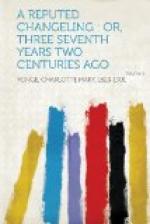It was an anxious period that spring of 1688. The order to read the King’s Declaration of Indulgence from the pulpit had come as a thunder-clap upon the clergy. The English Church had only known rest for twenty-eight years, and now, by this unconstitutional assumption of prerogative, she seemed about to be given up to be the prey of Romanists on the one hand and Nonconformists on the other; though for the present the latter were so persuaded that the Indulgence was merely a disguised advance of Rome that they were not at all grateful, expecting, as Mr. Horncastle observed, only to be the last devoured, and he was as much determined as was Dr. Woodford not to announce it from his pulpit, whatever might be the consequence; the latter thus resigning all hopes of promotion.
News letters, public and private, were eagerly scanned. Though the diocesan, Bishop Mew, took no active part in the petition called a libel, being an extremely aged man, the imprisonment of Ken, so deeply endeared to Hampshire hearts when Canon of Winchester and Rector of Brighstone, and with the Bloody Assize and the execution of Alice Lisle fresh in men’s memories, there could not but be extreme anxiety.
In the midst arrived the tidings that a son had been born to the king—a son instantly baptized by a Roman Catholic priest, and no doubt destined by James to rivet the fetters of Rome upon the kingdom, destroying at once the hope of his elder sister’s accession. Loyal Churchmen like the Archfields still hoped, recollecting how many infants had been born in the royal family only to die; but at Oakwood the Major and his chaplain shook their heads, and spoke of warming pans, to the vehement displeasure of Peregrine, who was sure to respond that the Queen was an angel, and that the Whigs credited every one with their own sly tricks.
The Major groaned, and things seemed to have reached a pass very like open enmity between father and son, though Peregrine still lived at home, and reports were rife that the year of mourning for his brother being expired, he was, as soon as he came of age, to be married to Mistress Martha Browning, and have an establishment of his own at Emsworth.
Under these circumstances, it was with much satisfaction that Dr. Woodford said to his niece: “Child, here is an excellent offer for you. Lady Russell, who you know has returned to live at Stratton, has heard you mentioned by Lady Mildmay. She has just married her eldest daughter, and needs a companion to the other, and has been told of you as able to speak French and Italian, and otherwise well trained. What! do you not relish the proposal?”
“Why, sir, would not my entering such a house do you harm at Court, and lessen your chance of preferment?”
“Think not of that, my child.”
“Besides,” added Anne, “since Lady Oglethorpe has written, it would not be fitting to engage myself elsewhere before hearing from her again.”




